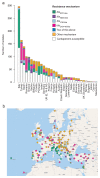Epidemic of carbapenem-resistant Klebsiella pneumoniae in Europe is driven by nosocomial spread
- PMID: 31358985
- PMCID: PMC7244338
- DOI: 10.1038/s41564-019-0492-8
Epidemic of carbapenem-resistant Klebsiella pneumoniae in Europe is driven by nosocomial spread
Abstract
Public health interventions to control the current epidemic of carbapenem-resistant Klebsiella pneumoniae rely on a comprehensive understanding of its emergence and spread over a wide range of geographical scales. We analysed the genome sequences and epidemiological data of >1,700 K. pneumoniae samples isolated from patients in 244 hospitals in 32 countries during the European Survey of Carbapenemase-Producing Enterobacteriaceae. We demonstrate that carbapenemase acquisition is the main cause of carbapenem resistance and that it occurred across diverse phylogenetic backgrounds. However, 477 of 682 (69.9%) carbapenemase-positive isolates are concentrated in four clonal lineages, sequence types 11, 15, 101, 258/512 and their derivatives. Combined analysis of the genetic and geographic distances between isolates with different β-lactam resistance determinants suggests that the propensity of K. pneumoniae to spread in hospital environments correlates with the degree of resistance and that carbapenemase-positive isolates have the highest transmissibility. Indeed, we found that over half of the hospitals that contributed carbapenemase-positive isolates probably experienced within-hospital transmission, and interhospital spread is far more frequent within, rather than between, countries. Finally, we propose a value of 21 for the number of single nucleotide polymorphisms that optimizes the discrimination of hospital clusters and detail the international spread of the successful epidemic lineage, ST258/512.
Conflict of interest statement
The authors declare no competing interests.
Figures





References
-
- World Health Organization. Global Priority List of Antibiotic-Resistant Bacteria to Guide Research, Discovery, and Development of New Antibiotics. World Health Organisation; 2017.
-
- Cassini A, et al. Attributable deaths and disability-adjusted life-years caused by infections with antibiotic-resistant bacteria in the EU and the European Economic Area in 2015: a population-level modelling analysis. Lancet Infectious Diseases. 2019;19:56–66. doi: 10.1016/S1473-3099(18)306054. - DOI - PMC - PubMed
-
- Martin J, et al. Covert dissemination of carbapenemase-producing Klebsiella pneumoniae (KPC) in a successfully controlled outbreak: long- and short-read whole-genome sequencing demonstrate multiple genetic modes of transmission. Journal of Antimicrobial Chemotherapy. 2017;72:3025–3034. doi: 10.1093/jac/dkx264. - DOI - PMC - PubMed
Publication types
MeSH terms
Substances
Grants and funding
LinkOut - more resources
Full Text Sources
Other Literature Sources

